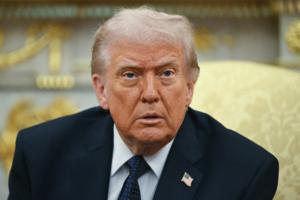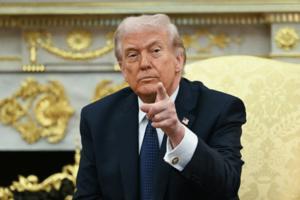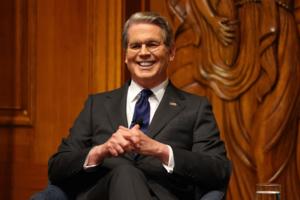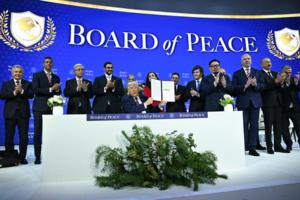Politics
/ArcaMax

Allison Schrager: Is free trade worth the cost in lives lost?
There is something about manufacturing jobs, and the manufacturing industry, that makes people sentimental. When they think of a factory worker, they think of him (it’s usually a he) as having great benefits, job stability and the ability to support his family. Donald Trump was elected president partly because of his promise, which he is ...Read more

Commentary: Getting rogue truckers out from behind the wheel
You may not recognize Karan Singh’s name, but you’ve likely heard of the problem his case exemplifies: workers who entered the U.S. illegally and began driving massive trucks, even if they were clearly unqualified – creating hazardous conditions for everyone on the road.
Singh, an Indian national, entered the U.S. illegally during the ...Read more

Commentary: What HBO's 'The Pitt' gets wrong about AI -- and what medicine misses
Generative artificial intelligence has already reshaped industries such as computer programming, retail, and manufacturing. In medicine, however, fears of clinical error have slowed adoption.
At present, two-thirds of doctors report using GenAI tools in practice, though half insist that stronger safeguards are needed.
This split — between ...Read more

Parmy Olson: Claude AI helped bomb Iran. But how exactly?
The same artificial-intelligence model that can help you draft a marketing email or a quick dinner recipe has also been used to attack Iran. U.S. Central Command used Anthropic’s Claude AI for “intelligence assessments, target identification and simulating battle scenarios” during the strikes on the country, according to a report in the ...Read more

Editorial: Standing firm: Despite reversal, DOJ is losing on law firms push
The Trump administration can’t even retreat from its unconstitutional attacks on law firms with any sense of dignity.
After months of unsuccessfully arguing for Donald Trump’s farcical executive orders attempting to punish prominent law firms that had worked with his perceived enemies, the Justice Department had apparently seen the light ...Read more

Mihir Sharma: Why you should worry about the other war on Iran's border
Since Pakistan declared “open war” on the Taliban regime in Kabul last week, it has sent waves of jets over its disputed border with Afghanistan. It continued to do so even as Iran, which neighbors both countries, was attacked by the U.S. and Israel and retaliated with drone and missile strikes across the region.
It takes a particular ...Read more

Trudy Rubin: Beware the similarities between the wars in Iraq and Trump's Iran war
President Donald Trump and his administration insist their war of choice in Iran bears zero similarity to the bitter Iraq War the U.S. plunged into 23 years ago. I disagree.
Both wars were based on lies about imminent threats from nuclear weapons to justify wars of choice. In 2003, the intelligence on Saddam Hussein’s nuclear program was ...Read more

Editorial: Trump's war of choice with Iran makes a mockery of the Constitution
Donald Trump, the president of war, keeps killing people at home and abroad.
Over the weekend, Trump presided over the assassination of Iran’s supreme leader. While many Iranians celebrated the end of Ali Khamenei’s 37-year reign of terror, the reckless gambit does not hide the fact that Trump violated the Constitution (again) by going to ...Read more

Commentary: Inside Iran, my family and other citizens are caught between celebration and fear
Early Saturday in Tehran, my father called me with his warm, steady voice to tell me that the attack had begun. As he always does, controlling his emotions carefully, he spoke calmly: “The war has started. They hit several places. But don’t worry — I’m fine.”
From that brief phone call, a moment filled with contradiction began. How ...Read more

Gene Collier: The Donald Trump guide to multi-national calamity
The last time an American president and his entourage of dissemblers face-planted into an international calamity, there was at least the courtesy of a meticulously produced pre-game show.
George W. Bush, who was routinely blistered for his suspect intellect, but looks like a cross between Copernicus and Abraham Lincoln compared to the ...Read more

Commentary: The economic common ground America isn't talking about
These days, it can feel like Americans across the political divide cannot agree on much of anything.
But there is encouraging news: When it comes to the economic foundations of human progress and flourishing, we are not as divided as we might think.
Political polarization has become a defining feature of American life. More and more people are...Read more

Commentary: How to bring down gas prices in California (Hint: Pumping oil won't help)
Growing up in California in the 1990s, I remember noticing gas prices along the drive to school. Any time the signs showed more than a dollar a gallon, we would hear the late great Bob Edwards on my parents’ car radio, interviewing energy experts on NPR’s “Morning Edition” about why costs were so high and when they’d come back down.
...Read more

Commentary: Donald Trump's tariff refund game to deny, delay and defy the Supreme Court
The Supreme Court ruled 6-3 that the $164.7 billion in tariffs collected under the International Emergency Economic Powers Act (IEEPA) was unlawful. In a constitutional system governed by judicial supremacy, such a decision should have marked the end of the matter. Instead, it has triggered a historic act of executive defiance.
Despite the ...Read more
POINT: Time changes have advantages year-round
America’s current daylight saving time system — spring-to-fall DST followed by winter standard time — is an excellent compromise, providing all of DST’s many benefits for the majority of the year and yet avoiding winter DST’s difficulties during the dark, cold months.
Evaluating DST is more complex than it might initially seem. Many ...Read more
COUNTERPOINT: Make year-long standard time the nationwide standard again
I’m one of the many Americans who hate being forced to time-shift twice a year. After only four months on standard time, daylight saving time returns with a vengeance on Sunday, March 8, when 2 a.m. abruptly becomes 3 a.m.
Only residents of Arizona (with the exception of those living on the land reserved for the Navajo Nation, which is ...Read more
POINT: The peace president's war
President Donald Trump entered his second term promising to measure America’s success not only by the battles we win but the ones we end. Operation Epic Fury has become the largest test of that vision. Trump’s critics call it a “war of choice.”
They are partly right. Trump has finally decided to end the 47-year war the Islamic Republic ...Read more

COUNTERPOINT: War with Iran means short-term and long-term damage
Few will mourn the demise of Iran’s supreme leader or other senior Iranian security officials who terrorized the Iranian people and destabilized countries across the region.
However, it is noteworthy that, save Israel, none of the countries in the region publicly supported military action against Iran. They understood that while Ayatollah ...Read more

Jenice Armstrong: Trump's reckless war proves his Board of Peace is a farce
New York Times-verified images from a scene in southern Iran are horrific. A severed arm of a child lying in the rubble. Backpacks covered in ashes. The dead in body bags. Video of rescue workers digging through the remains of what had been a modest, two-story school near a military installation in southern Iran.
Please stop for a moment and ...Read more

Editorial: Unclear war aims are a recipe for disaster in Iran
President Donald Trump’s decision to launch a major conflict with Iran is almost certainly his most consequential presidential decision to date, and may be the most important action of the U.S. government since former President George W. Bush’s Iraq War.
Yet while that conflict was preceded by several months of (often misleading or ...Read more

John Rash: One Iranian's perspective on his country's convulsions
“One Battle After Another” may be the odds-on Oscar favorite, but another nominee, for Best International Feature Film, says more about a society perpetually stressed by militarism. “It Was Just an Accident” comes from Iranian director Jafar Panahi, who channels his two terms in Tehran’s notoriously evil Evin prison into a plot about a...Read more




















































